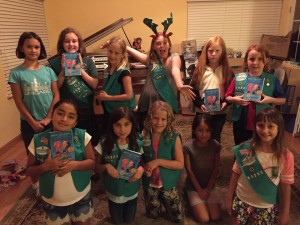|
|
April 9, 2018
 If not, what will I do without you? A minor disagreement with a best friend can be worked out with a simple, honest conversation. But a major disagreement, for example, one of you wants more time/closeness than the other, is tougher to resolve. You still need to talk about it. Sitting on feelings (like resentment and jealousy) only intensifies them. Intense feelings may lead you to doing and saying things you’ll later regret. Not good for you or the friendship.
Here’s a recent email from a girl who’s having a hard time dealing with jealousy in a friendship.
Teen: Me and my best friend have been close for quite a long time, but I know the friendship is on the verge of unhealthy. I value the friendship more than she does, which means I put way more effort into it. I get jealous whenever she spends time with other people. I’ve tried to step back and give her space, but I miss her already. I know that we can’t be friends like we used to be, but I don’t know how to stop these feelings. When the friendship ends she’ll move on with her other friends and I’ll be heartbroken. What do I do? Thanks 🙂
Annie: This friendship sounds a bit unbalanced. That’s not necessarily a bad thing. Sometimes one friend has a busier schedule than the other. That doesn’t mean she cares less than the one who has more free time. Sometimes both friends feel the need for “time together and time apart.” That gives both people a chance to explore other friendships and other interests. This can be a good thing even if it feels strange at first.
The real measure of friendship is not the amount of time. It’s how both people feel when they are together. It sounds like you feel unappreciated by your friend and jealous of how happy she is with other people. You said it yourself, “I value the friendship more than she does.” Yes, it seems that’s true. That’s a problem because it makes you feel powerless and unworthy. Like you don’t count.
Here’s something to think about: We can get so used to things in a friendship (who puts in more effort/who values the friendship more, etc.) that it all seems normal. There is nothing normal about feeling like you don’t count in a friendship! You count as much as much as she does. You deserve a friend who wants to be with you as much as you want to be with her. That doesn’t mean you two have to be together all the time or that neither of you can have other friends. It simply means that when you are together, you ought to feel accepted, respected and appreciated. If you don’t then it’s time for you to stand up for yourself. Either you can talk to her about her behavior or you can take her behavior as a clear sign that she is less interested in this friendship than you are.
If that’s the case, I’d suggest you go shopping for a new best friend.
Teen: That makes so much sense, thank you. I just don’t know how I’m gonna cope without her and I’m not exactly the kind of person who makes friends easily. Any tips?
Annie: First make a list to help you understand what qualities are important to you in a friend. Fill in the blank to this sentence:
I want a friend who is ___________________________.
Keep filling in the blank until you run out of ideas. This list will help you understand what you’re looking for and how to recognize it when you find it. Also, please know that a friendship is a two-way street. Make sure that you are able to give to a friend the same things you expect a friend to give to you.
Good luck!

November 7, 2015
 We’ve got the tools and we’re brave enough to use ’em! Last month I began partnering with the Girl Scouts of Northern California by presenting my Girls Friendship without the Drama Workshops. In the first hour I teach girls to navigate all kinds of sticky peer conflicts while the moms (and the few cool dads who’ve shown up) sit back, listen and observe. During the second hour the girls skedaddle into another room where they engage in more (supervised) friendship-building skills while the parents and I circle the wagons and get to the heart of what girls need from those of us who love them.
To date I’ve done nine of these workshops with another seven scheduled. Girls can’t wait to start using what they’ve learned. Moms are reminded how painful it can be feel “replaced” by a friend. Dads are stunned at how hard it is for girls to tell a friend, “Stop. I don’t like that.” Parents are thrilled to have new insight, language, and context to help their daughters do a better job navigating friendships.
Here are some tips to help you help your daughters and sons resolve the inevitable issues that come up between our kids and their peers.
Dealing with Friendship Challenges
- Calm Down. No matter what awful thing some child has done to your daughter or son, calming down first makes it easier to get through the upset. So take some slow deep breaths and encourage your child to do the same.
- Show that you get it. Acknowledge that it hurts when a friend turns against you. Reflect back what you hear, “You sound really hurt, angry, and confused.” Share one of your own “hurt by a friend” stories. Share what you learned and how you used it to become a more thoughtful person and a better friend. This models empathy and reassures your child that (s)he will survive.
- What Can/Can’t You Control? Tell your child, “You can’t control a friend’s behavior or feelings, but you can get a handle on your own.” When we try to control things we can’t control, it stresses us out and makes us feel powerless. Don’t let your kid go there!
- You’ve got options! Even after a blow-up with a bff, your child is far from powerless. She always has options. For example, your child might:
- Never talk to that friend again
- Get back at her by spreading gossip
- Suppress the hurt and act like it didn’t bother you
- Find new friends
Brainstorming should be open-ended. Encourage your child to freely explore ideas without your judging them. They’re just ideas and this is a clearing process. Even the worst, knee-jerk options offer great (and totally safe) learning opportunities. In addition, you’ll give your child a gift by talking about all of this. When s/he doesn’t have to worry about your rushing in to “fix” the problem, your child’s thinking process will be accelerated. Hopefully, she’ll move closer to the time when she no longer accepts disrespectful behavior from anyone, including herself!
At the end of the process your child may decide to take a vacation from the drama or to find the EXIT out of the friendship. That’s her choice. But just because she’s finished, doesn’t mean she has the right to make life unhappy for an ex-friend. I put it is this way: You have the right to choose your friends, but it’s NEVER okay to be cruel or disrespectful. Keep your distance if you choose, but always treat others the way you want to be treated. Old rule. Still applies.

July 30, 2015
 What’s wrong with you? Can’t you take a joke?! For better or for worse, our tweens and teens spend immeasurably more time with their friends than we did at their age. UOK wid dat? If we allow it, digital access enables them to connect every waking hour. These interactions strengthen interpersonal skills as often as they undermine them. Our kids must learn to set boundaries with other kids so they’ll develop confidence in who they are and what they need in a relationship.
Today’s question comes from a parent whose 10-year-old daughter has two challenging friendships.
Friend A says things to my daughter that undermine her confidence (“Everyone knows your writing sucks.”) but then laughs it off as a joke. Friend B is very sweet and kind, but too clingy. She always wants to do whatever my daughter does. Are there phrases she could use to help her tell the bitchy chick to change or go away, and to tell the lovely friend to be more independent?
– Frustrated Mom
Setting boundaries is something we all have to learn, because we need to teach people how to treat us. When we stay silent in the face of insults or we laugh along with the people mocking us, we send this message: “It’s OK for you to put me down.” Since that’s not the message your daughter wants to send, she needs to speak up for herself.
When Friend A makes nasty comments then hides behind “Just kidding!” your daughter needs confidence to let the girl know she just “crossed the line.” Ah, but how?
Many girls equate challenging a friend with being “mean” and that’s part of the reason they avoid “confrontations.” Make sure your daughter understands this isn’t a confrontation, it’s a respectful communication. Let her also know that standing up for herself (or others) doesn’t make her “mean” it makes her brave.
Advise your girl to stay calm and strong while she makes eye-contact, and simply speaks the truth. She might say something like this to Friend A: “That didn’t feel like ‘kidding’ to me. It hurts. If you’re really my friend, you won’t do that again.” Now Friend A has been put on notice and your daughter has taken back her power. If your daughter needs help saying these words, role play with her until she feels ready for the conversation. Hopefully this will work. If Friend A continues to make cutting remarks, then your daughter will have to continue standing up for herself and/or find the EXIT to this friendship.
In the case of “too clingy” Friend B… that’s a bit trickier. Your daughter has the right to choose who she spends time with but she doesn’t ever have the right to intentionally hurt anyone. (Remind her how it feels to be on the receiving end of one of Friend A’s zingers.) But that doesn’t mean she must continue to allow herself to be smothered in her clingy friend’s embrace. She might say something like this to Friend B: “I like spending some time with you but not all the time. I want to spend time with other friends, too. So today, let’s hang out together during lunch recess. Then tomorrow I’m going to hang out with Friend C.” That’s a clear communication and it is sensitive and respectful. Friend B may not be happy to hear that she won’t be with your daughter tomorrow, but if your daughter stays calm and delivers the message clearly and confidently, Friend B will (eventually) figure out that she needs to widen her friendship circle.

September 9, 2014
This recent email has me vibrating with rage. I know. I know. I’m supposed to manage my destructive emotions. Take re-centering breaths and all that. But as a woman, a mom, and an educator, this one has me ready to strangle someone.
 I’m not going back there. Just read it and tell me what you think:
Hey Terra,
I just started freshman year and I have to take swim class. I have large breasts and the girls in the class make fun of me in the shower and in the pool. Today, while we were swimming, one girl went into my locker and stole my bra. I had to get dressed for my next class without a bra!! Do you have any idea how humiliated I felt walking around like that? Guys were staring at me and a few guys tried to touch my breasts! That’s what I had to go through for two whole periods until my mom came and brought me a bra. This is the first year of high school and I’m a joke already. All my friends are at another school so I’ve got no one who has my back. – Who Cares?
Before you read my answer, here’s my video response on Vidoyen:
How do we teach kids that cruel is not cool? posted by Annie Fox, M.Ed. on Vidoyen.
My Answer:
Dear Who Cares?
First, let me say that I care. A lot!
Second let me say… WOAH!!! What happened to you today is beyond awful. It is also totally unacceptable. For starters, shaming you about your body, having people stare at your breasts and try to touch you… all of this is sexual harassment and it’s against the law.
I understand how awful you feel, but please talk to your PE teacher ASAP! (That’s who runs the swimming class, right?) She or he (hopefully it’s a she) but either way, the PE teacher needs to know immediately what happened today. No way should any girl get away with going into your locker and stealing anything! But a girl stealing another girl’s bra… that’s so cruel I am actually seeing red. (That’s how angry I am right now.) And no boy should get away with trying to touch you without your permission! (Give me a break, guys. What idiot told you that’s ever OK?!)
I get that you might not want to talk about this, but you wrote to me for advice and I’m giving it to you. Talk to your mom right now. Get off the computer and talk to her. You think that “no one has your back.” Not true! Your mom has your back. She proved that today. She can help you. She wants to. If you were my daughter I would tell you this, “I am so sorry that this happened to you. My heart is breaking to hear about it. I know how humiliating this must have been! We need to work together, you and I, to make things better for you at school. Better for you with the girls in your gym class and better for you with those ignorant boys who bother you and made you feel even more uncomfortable when you walk down the hall. You need to let the school know what happened. If you feel you can call for this meeting on your own, then go for it. But if you need my support to call the school and set up a meeting with the PE teacher and the counselor and school administration, then I am here for you 1000%.”
Talk to your mom right now… before another day of school.
OK, sweetie?
In friendship,
Terra
If you or anyone you know, has had an experience involving sexual harassment or “body shaming” at school, I want to hear about it in the COMMENTS section. Thanks.

| |















